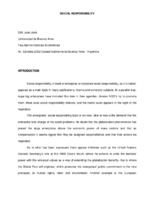| dc.creator | Gilli, Juan José | |
| dc.date.accessioned | 2023-08-07T23:42:01Z | |
| dc.date.available | 2023-08-07T23:42:01Z | |
| dc.date.issued | 2021-11-17 | |
| dc.identifier.citation | Gilli, J. J. (2021). Social responsibility. Visión de Futuro, Revista Científica. Posadas (Misiones): UNaM. FCE. APLICACIÓN; 5(1), 16 p. | es_AR |
| dc.identifier.issn | 1668 – 8708 (Versión en línea) | |
| dc.identifier.other | VF-485 | |
| dc.identifier.uri | https://hdl.handle.net/20.500.12219/4927 | |
| dc.description | Fil: Gilli, Juan José. Universidad de Buenos Aires. Facultad de Ciencias Económicas; Argentina. | es_AR |
| dc.description.abstract | Social responsibility in itself or enterprise or corporate social responsibility, as it is called, appears as a main topic in many publications, forums and university subjects. In a parallel way, large big enterprises have included this item in their agendas; diverse NGO’s try to promote them, there arise social responsibility indexes, and the matter even appears in the sight of the regulators.
The enterprises’ social responsibility topic is not new, what is new is the demand that the enterprise take charge of the social problems. No doubt that the globalization phenomenon has placed the large enterprises above the economic power of many nations and that as compensation it seems logical that they be assigned responsibilities and that their actions be regulated.
As to what has been expressed there appear initiatives such as the United Nations General Secretary’s one at the 1999 Davos forum, where he exhorts to unite the markets’ power with the universal values as a way of extending the globalization benefits; that is where the Global Pact will originate, which promotes the enterprises’ public commitment to the nine principles on human rights, labor and environment. Another example is the European Community’s Green Book, which in 2002, promotes enterprise responsibility in its internal and also external dimension.
To the above-mentioned, one must add the increasing disbelief regarding the state’s capacity to solve the social problems. This situation is specially highlighted in certain regions, for example Latin America, where public funds are invested electorally instead of promoting human development; poverty becomes the political resource. These attitudes according to Valiente Noailles1 promote in fact a subhuman form and a condemnation to permanent exclusion.
The situation described outlines a series of queries regarding the reach of social responsibility and of how it should be administrated within the enterprise environment. The present work seeks to ponder on matters such as: When does the concept of social responsibility arise? How has it evolved through time? What does social responsibility mean according to different authors and ways of thought? Which is the enterprise’s social responsibility? To what measure is it licit and suitable for the enterprise to take on the responsibility of social dysfunctions? Should the enterprise social responsibility be regulated? Is social responsibility a philanthropy matter or a marketing one? Does social responsibility make sense, without ethical management?. | es_AR |
| dc.format | application/pdf | |
| dc.format.extent | 131 KB | |
| dc.language.iso | eng | es_AR |
| dc.publisher | Universidad Nacional de Misiones. Facultad de Ciencias Económicas. Programa de Posgrado en Administración | es_AR |
| dc.relation | info:eu-repo/semantics/altIdentifier/urn/https://visiondefuturo.fce.unam.edu.ar/index.php/visiondefuturo/article/view/680/610 | |
| dc.rights | info:eu-repo/semantics/openAccess | |
| dc.subject | Social responsibility | es_AR |
| dc.subject | Corporate responsibility | es_AR |
| dc.title | Social responsibility | es_AR |
| dc.type | info:eu-repo/semantics/article | es_AR |
| dc.type | info:ar-repo/semantics/artículo | |
| dc.type | info:eu-repo/semantics/publishedVersion | |



